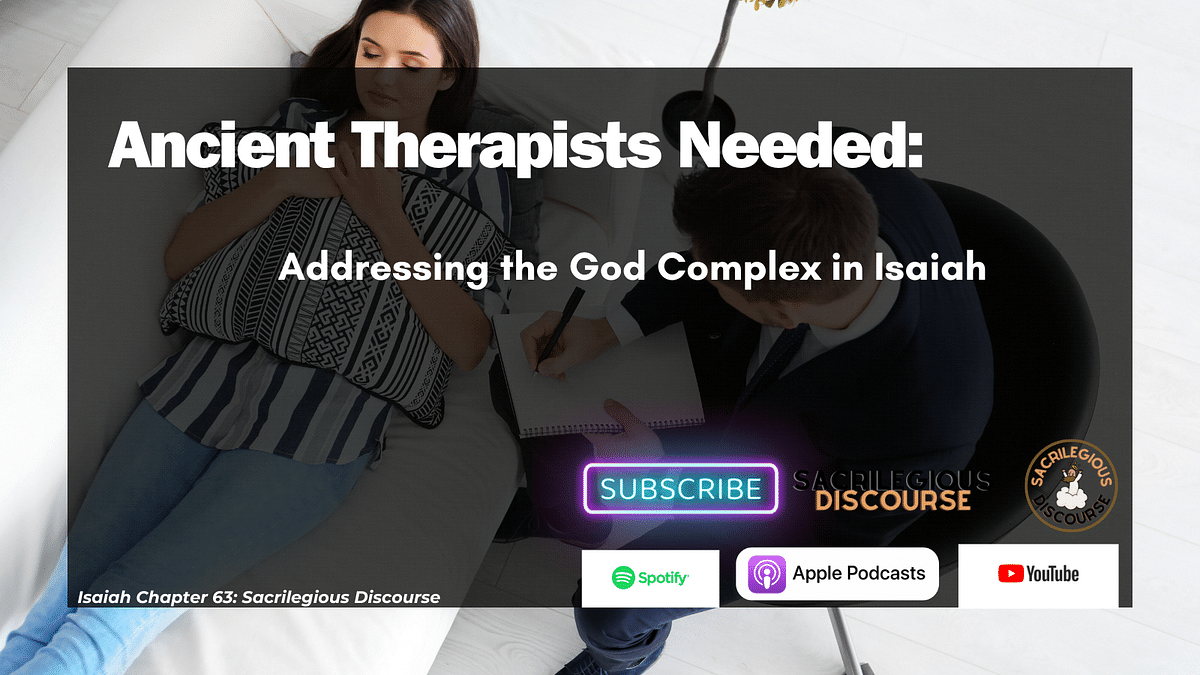
If there's one thing we've learned from the latest foray into the convoluted depths of biblical scripture, it's that the ancient world was in dire need of some serious psychotherapy. In our latest podcast episode, "Isaiah Chapter 63," we tackle the baffling rollercoaster that is God's mood swings, as illustrated in the Book of Isaiah. And let me tell you, folks, if there were ever a case for divine intervention in mental health, this is it.
We start with the whimsy of divine real estate deals by recapping Isaiah 62, where God rebrands the land of Israel with new names like a cosmic flipper on an HGTV binge. It's all lovey-dovey and marriage-like until we hit Isaiah 63 and find God coming back from Edom like a vengeful winemaker in a garment suspiciously similar to Lady Macbeth's handiwork. The contrast is as stark as it is puzzling. It’s like we're reading the transcript of a celestial therapy session where the therapist skipped town.
Here's the thing: God's got a complex. He's dishing out names and promises with the kind of fervor that'd make a televangelist blush. But in the next breath, He's a crimson-clad, wrathful figure who seems to forget the whole "turn the other cheek" memo. I mean, come on. This deity needs a chill pill—or better yet, a dedicated deity therapist to work through His issues.
Our podcast dives into these juicy tidbits, unraveling the chaos that is divine justice in Isaiah. It’s a potent mix of theology, history, and just a touch of righteous indignation. And believe me, the indignation is justified. This isn't just some divine retribution; it's a full-blown godly tantrum that would make even the most stoic philosopher spit out their wine.
Let's not forget the human element in this divine drama. The Israelites, like a cosmic yo-yo, are pulled between divine favor and fury, leaving them—and us modern readers—utterly perplexed. We explore the implications of this for the faithful of the time, as well as for contemporary believers who might find their forefathers' antics a bit out of touch. It's like realizing your great-great-grandfather might not approve of your binge-watching habits or your Tinder swipes.
But wait, there's more. We discuss the apparent disconnect between the chosen people and their patriarchs. Abraham and Jacob would likely be scratching their beards in confusion if they could see their descendants now. And who could blame them? If the 1800s seem like a foreign country, then ancient Israel is a different universe.
Unleash endless audiobooks & podcasts with Audible Plus: 30 days FREE, then just $7.95/month. ✨ Click & dive in!
In the end, what we get from Isaiah is a god who seems to play favorites like a celestial mean girl, leaving destruction in His wake and calling it justice. It's the kind of storyline that would have us clutching our pearls if it weren't so absurdly archaic. But here we are, still reading and dissecting it like the masochists we apparently are.
So, here's the takeaway: if anyone out there has a time machine and a degree in ancient psychotherapy, please consider a trip to the Old Testament times. It's clear that a divine couch session or two might have saved us all a lot of confusion and scriptural whiplash. And hey, while you're at it, let's hope you can steer the narrative toward a more enlightened path, one where compassion and consistency aren't so hard to come by.
For those of you who want to join us in this snarky but educational romp through the trials and tribulations of the Old Testament God, tune in to our podcast. It's a ride you won't want to miss—like watching a car crash in slow motion, if the cars were chariots of fire and the drivers prophets with a penchant for hyperbole.
Until next time, keep your gods in check, and maybe send a therapist or two their way. Heaven knows they could use one.






